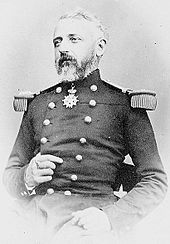Félix-Charles Douay
Félix-Charles Douay (born August 14, 1816 in Paris , † May 4, 1879 there ) was a French general .
Life
At the age of 16, Félix-Charles Douay joined the French marines as a simple soldier in 1832 and was promoted to lieutenant six years later . In 1849 he took part in the expedition to Rome , in 1853 in the campaign in Algeria and in 1854 in the Crimean War. In 1855 Douay was promoted to colonel and as such took part in the campaign in Italy under Marshal Adolphe Niel . He fought in the Battle of Magenta (June 4, 1859), was seriously wounded during the Battle of Solferino on June 24, 1859 and then promoted to Brigadier General.
At the beginning of the French intervention in Mexico , Douay went to this Central American country with reinforcement troops in 1862, was appointed division general in January 1863 and defeated the Mexican general Uraga , who threatened Mexico with 15,000 Indians. After his return to France in March 1867, he became an adjutant to Emperor Napoleon III. and commander of the 1st Infantry Division in Paris.
When the Franco-Prussian War broke out in July 1870, Douay was given command of the 7th Army Corps, which gathered at Belfort . Since it was not yet fully operational, only one of its divisions was able to take part in the Battle of Wörth (August 6, 1870), as Douay succumbed to the beetle wood . After the French defeat there, Douay and the rest of his troops were called to Châlons-sur-Marne , where he united with Mac-Mahon and moved to Metz under his command . He fought on August 31 at Mouzon and on September 1 at Floing and Illy against the 5th and 11th Prussian Corps and was captured by the Germans when Sedan surrendered on September 2, 1870.
After the peace treaty, Douay was given command of the troops formed at Auxerre , with whom he occupied Boulogne in the fighting against the Paris Commune on May 6, 1871 and after a series of battles was the first to penetrate the capital on May 22. Due to his determined leadership and circumspection, the Louvre , which was set on fire by the Communards , was saved from total destruction on May 26, 1871, and the Belleville district was taken the next day . A few days after the subjugation of the city, Douay and his army corps were sent to Lyon and he was given the command of the Territorial Military Division of the Rhône . After the reorganization of the French army in 1873 he was given command of the 6th Army Corps in Châlons-sur-Marne, became a member of the Defense Commission and in 1879 one of the newly appointed inspectors general. He died in Paris on May 4, 1879 at the age of 62.
His older brother, Charles Abel Douay (1809-1870), fell as commander of the 2nd division in the Mac-Mahons corps on August 4, 1870 near Weissenburg.
literature
- Félix-Charles Douay . In: Meyers Konversations-Lexikon . 4th edition. Volume 5, Verlag des Bibliographisches Institut, Leipzig / Vienna 1885–1892, pp. 91–92.
Individual evidence
- ^ Geoffrey Wawro: The Franco-Prussian War: The German Conquest of France in 1870-1871. Cambridge University Press, 2003, ISBN 0-521-58436-1 .
| personal data | |
|---|---|
| SURNAME | Douay, Felix-Charles |
| BRIEF DESCRIPTION | French general |
| DATE OF BIRTH | August 14, 1816 |
| PLACE OF BIRTH | Paris |
| DATE OF DEATH | May 4, 1879 |
| Place of death | Paris |
